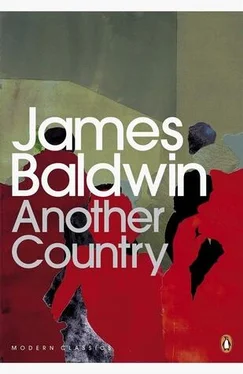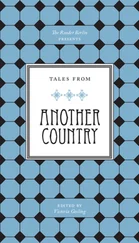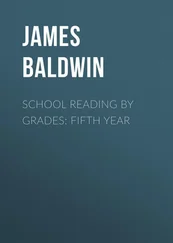Rufus walked to Vivaldo’s window. “So you been all up and down that street, too,” he said.
“We’ve all been up the same streets. There aren’t a hell of a lot of streets. Only, we’ve been taught to lie so much, about so many things, that we hardly ever know where we are.”
Rufus said nothing. He walked up and down.
Vivaldo said, “Maybe you should stay here, Rufus, for a couple of days, until you decide what you want to do.”
“I don’t want to bug you, Vivaldo.”
Vivaldo picked up Rufus’ empty glass and paused in the archway which led into his kitchen. “You can lie here in the mornings and look at my ceiling. It’s full of cracks, it makes all kinds of pictures. Maybe it’ll tell you things it hasn’t told me. I’ll fix us another drink.”
Again he felt that he was smothering. “Thanks, Vivaldo.”
Vivaldo dragged his ice out and poured two drinks. He came back into the room. “Here. To all the things we don’t know.”
They drank.
“You had me worried,” said Vivaldo. “I’m glad you’re back.”
“I’m glad to see you,” said Rufus.
“Your sister left me a phone number to call in case I saw you. It’s the lady who lives next door to you. I guess maybe I should call her now.”
“No,” said Rufus, after a moment, “it’s too late. I’ll go on up there in the morning.” And this thought, the thought of seeing his parents and his sister in the morning, checked and chilled him. He sat down again in the easy chair and leaned back with his hands over his eyes.
“Rufus,” Leona had said — time and again—“ain’t nothing wrong in being colored.”
Sometimes, when she said this, he simply looked at her coldly, from a great distance, as though he wondered what on earth she was trying to say. His look seemed to accuse her of ignorance and indifference. And, as she watched his face, her eyes became more despairing than ever but at the same time filled with some immense sexual secret which tormented her.
He had put off going back to work until he began to be afraid to go to work.
Sometimes, when she said that there was nothing wrong in being colored, he answered,
“Not if you a hard-up white lady.”
The first time he said this, she winced and said nothing. The second time she slapped him. And he slapped her. They fought all the time. They fought each other with their hands and their voices and then with their bodies: and the one storm was like the other. Many times — and now Rufus sat very still, pressing darkness against his eyes, listening to the music — he had, suddenly, without knowing that he was going to, thrown the whimpering, terrified Leona onto the bed, the floor, pinned her against a table or a wall; she beat at him, weakly, moaning, unutterably abject; he twisted his fingers in her long pale hair and used her in whatever way he felt would humiliate her most. It was not love he felt during these acts of love: drained and shaking, utterly unsatisfied, he fled from the raped white woman into the bars. In these bars no one applauded his triumph or condemned his guilt. He began to pick fights with white men. He was thrown out of bars. The eyes of his friends told him that he was falling. His own heart told him so. But the air through which he rushed was his prison and he could not even summon the breath to call for help.
Perhaps now, though, he had hit bottom. One thing about the bottom, he told himself, you can’t fall any farther. He tried to take comfort from this thought. Yet there knocked in his heart the suspicion that the bottom did not really exist.
“I don’t want to die,” he heard himself say, and he began to cry.
The music went on, far from him, terribly loud. The lights were very bright and hot. He was sweating and he itched, he stank. Vivaldo was close to him, stroking his head; the stuff of Vivaldo’s sweater stifled him. He wanted to stop crying, stand up, breathe, but he could only sit there with his face in his hands. Vivaldo murmured, “Go ahead, baby, let it out, let it all out.” He wanted to stand up, breathe, and at the same time he wanted to lie flat on the floor and to be swallowed into whatever would stop this pain.
Yet, he was aware, perhaps for the first time in his life, that nothing would stop it, nothing: this was himself. Rufus was aware of every inch of Rufus. He was flesh: flesh, bone, muscle, fluid, orifices, hair, and skin. His body was controlled by laws he did not understand. Nor did he understand what force within this body had driven him into such a desolate place. The most impenetrable of mysteries moved in this darkness for less than a second, hinting of reconciliation. And still the music continued, Bessie was saying that she wouldn’t mind being in jail but she had to stay there so long.
“I’m sorry,” he said, and raised his head.
Vivaldo gave him a handkerchief and he dried his eyes and blew his nose.
“Don’t be sorry,” said Vivaldo. “Be glad.” He stood over Rufus for yet another moment, then he said, “I’m going to take you out and buy you a pizza. You hungry, child, that’s why you carrying on like that.” He went into the kitchen and began to wash his face. Rufus smiled, watching him, bent over the sink, under the hideous light.
It was like the kitchen in St. James Slip. He and Leona had ended their life together there, on the very edge of the island. When Rufus had ceased working and when all his money was gone, and there was nothing left to pawn, they were wholly dependent on the money Leona brought home from the restaurant. Then she lost this job. Their domestic life, which involved a hideous amount of drinking, made it difficult for her to get there on time and also caused her to look more and more disreputable. One evening, half-drunk, Rufus had gone to the restaurant to pick her up. The next day she was fired. She never held a steady job again.
One evening Vivaldo came to visit them in their last apartment. They heard the whistles of tugboats all day and all night long. Vivaldo found Leona sitting on the bathroom floor, her hair in her eyes, her face swollen and dirty with weeping. Rufus had been beating her. He sat silently on the bed.
“Why?” cried Vivaldo.
“I don’t know,” Leona sobbed, “it can’t be for nothing I did. He’s always beating me, for nothing, for nothing!” She gasped for breath, opening her mouth like an infant, and in that instant Vivaldo really hated Rufus and Rufus knew it. “He says I’m sleeping with other colored boys behind his back and it’s not true, God knows it’s not true!”
“Rufus knows it isn’t true,” Vivaldo said. He looked over at Rufus, who said nothing. He turned back to Leona. “Get up, Leona. Stand up. Wash your face.”
He went into the bathroom and helped her to her feet and turned the water on. “Come on, Leona. Pull yourself together, like a good girl.”
She tried to stop sobbing, and splashed water on her face. Vivaldo patted her on the shoulder, astonished all over again to realize how frail she was. He walked into the bedroom.
Rufus looked up at him. “This is my house,” he said, “and that’s my girl. You ain’t got nothing to do with this. Get your ass out of here.”
“You could be killed for this,” said Vivaldo. “All she has to do is yell. All I have to do is walk down to the corner and get a cop.”
“You trying to scare me? Go get a cop.”
“You must be out of your mind. They’d take one look at this situation and put you under the jailhouse.” He walked to the bathroom door. “Come on, Leona. Get your coat. I’m taking you out of here.”
“I’m not out of my mind,” Rufus said, “but you are. Where you think you taking Leona?”
“I got no place to go,” Leona muttered.
Читать дальше












